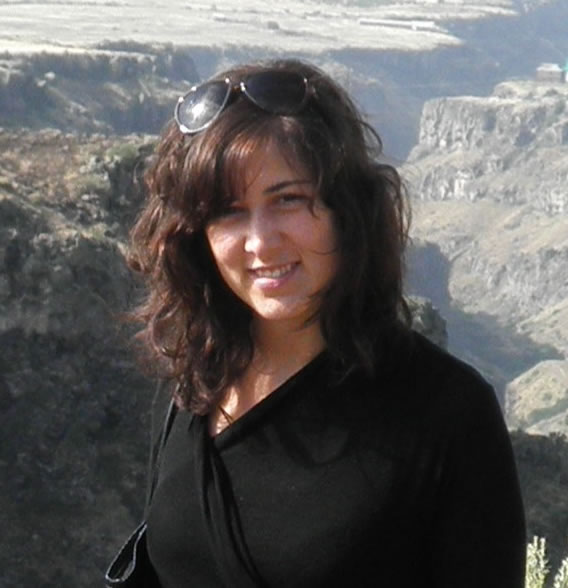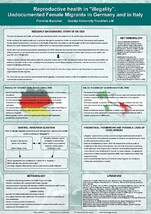|
|
Short CVI was born in Italy in 1984. I studied at the University of Padova, Italy and in 2007 I received my B.A. Degree in Political Sciences and International Relations (Focus on International Relations and Human Rights-) with Final Grade 110/110 Cum laude. In 2010 I received my M.A. In International Politics and Diplomacy with Final Grade 110/110 Cum laude. After my M.A. graduation I decided to focus my research interest on migration studies. I continued my academic career in Germany- where I had spent one semester during my Bachelor study - and I started a PhD in Sociology. Since 2012 I am part of the International PhD Program “Democracy, Knowledge, and Gender in a Transnational World” (IPP transnational) at the Goethe University in Frankfurt am Main, Germany. |
My dissertation project is entitled Reproductive health in 'illegality'. Undocumented female migrants in Germany and in Italy (working title) and deals e.g. with the topics of undocumented migration, reproductive health and intimacy. I apply a qualitative methodology based on biographical-narratives interviews which I conducted during field work in Berlin and in Rome.
My research interests are e.g. (undocumented) migration, biographies, feminist methodology, ethical issues in the research.
I am currently part of a Doctoral working group (Doc AG) on ethical issues in qualitative research.
Dissertation Project
REPRODUCTIVE HEALTH IN THE “ILLEGALITY”. UNDOCUMENTED FEMALE MIGRANTS IN GERMANY AND IN ITALY
For undocumented female migrants living in the European Union taking care of their reproductive health can turn into a problematic issue. Despite the fact that (reproductive) health has been internationally recognized as a human right- which means that every human being is entitled to it- undocumented migrants in many European countries experience legal and practical obstacles when trying to access health care facilities. Moreover, the unfavorable conditions characterizing a life in “illegality”, e.g. legal, social and economical uncertainty, fear of being discovered and deported, are likely not only to negatively affect female migrants' state of (reproductive) health, but also to influence their personal attitudes and decisions in matters of pregnancy, abortion and contraception.
Based on qualitative research methodology, the project encompasses the conduct of narrative interviews with undocumented female migrants who, while “living in the illegality” are or have been confronted with reproductive health issues, especially pregnancy, abortion and contraception.
The field work takes place in Germany and in Italy, two countries that represent important destination for (regular and irregular) migration and wide labour markets for female migrants, but strongly differ in their migration regimes as well as in the structure and ”openness”of their health care system.
I will look into undocumented female migrants' experiences in accessing health care in Germany and in Italy and emphasize the role played by the different national-based policies and laws, as well as highlight shortcomings and possible improvements at the legal and policy level. Furthermore, I will investigate how the structural element- the lack of legal status and the related (possibly limited) access to health care- affects subjective attitudes and decisions on reproductive health. In addition to that, going beyond the idea of undocumented migrants as only resigned and passive individuals, the research will shed light on their agency, for instance in developing strategies to cope with the lack of access to health care facilities or with specific reproductive issues.





